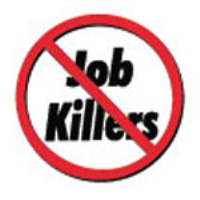Chamber of Commerce Prepares for the War on “Job Killers”

It’s open season on “job-killer” legislation in the state Capitol, as the California Chamber of Commerce targets a range of Democrats’ bills and assigns them their favorite epithet. Name calling seems to work.
Last year, 24 of the 27 bills targeted by the chamber ended up in “The Graveyard,” despite a distinct minority of Republican lawmakers. So, the April release of its preliminary list of 16 new targets is not without interest. The chamber expects to add more soon.
The subjects include a range of subjects, including the environment, employment, privacy, energy and taxes (of course).
The chamber’s liberal use of “job killer” may not be appropriate, according to a study out of the University of Northern Iowa, but it is an effective way to propagandize one’s position. Analyzing 381 “job killer” stories published by the Washington Post, the New York Times, the Wall Street Journal and the Associated Press, the study concluded that fewer than 10% justified use of the term, which was often contained in a source’s quote.
Among those on this year’s list so far are:
Senate Bill 3—Increases the minimum wage $3 by July 2017. “Unfairly increases employers’ costs.”
Assembly Bill 356—Restricts the number of oil industry injection wells that are endangering groundwater and requires more government monitoring. “Jeopardizes high-paying middle class jobs in resource extraction fields by severely restricting wastewater injection sites and requiring unnecessary monitoring of those sites.”
Assembly Bill 1490—Suspends oil and gas well-stimulation (fracking et al), which have been linked to earthquakes, just after a 2.0 or higher shaker until a seismic analysis is completed. “Drives up fuel prices and energy prices.”
Senate Bill 32—Expands the state’s mandate to reduce greenhouse gases by requiring an 80% decline from the 1990 level by 2050. “Increases costs for California businesses.”
Assembly Bill 465—Makes arbitration agreements as a condition of employment verboten. “Significantly drives up litigation costs for all California employers” and “increases pressure on the already-overburdened judicial system.”
Senate Bill 576—Requires any mobile application that collects geolocation information from a user to make it clear that it is doing so and obtain consent. “Stifles innovation and growth in the mobile application economy . . . with no benefit to the consumer.”
Senate Bill 684—Increases the tax rate for corporations that have a specified decrease in the percentage of their full-time workforce in the United States compared to their contracted and foreign full-time employees. The chamber response was hard to discern over the sound of exploding heads, but they said, “Threatens to significantly increase the corporate tax rate.”
Assembly Bill 357—Requires food and general retail establishments to give workers their schedules at least two weeks ahead of time or compensate them for the inconvenience. The “one-size-fits-all” measure is “unfair.”
Assembly Constitutional Amendment 4—Lowers the percentage of voters need to increase taxes for local transportation projects from 66% to 55%. “Adds complexity and uncertainty to the current tax structure.”
–Ken Broder
To Learn More:
CalChamber’s "Job Killers" List Returns (by Steven Mikulan, Capital & Main)
Calchamber Targets Minimum Wage Increase, Employee Scheduling Bills as “Job Killers” (by Alexei Koseff, Sacramento Bee)
“Job Killer” Bills Dead on Arrival (by Ken Broder, AllGov California)
2015 Preliminary Job Killer List (California Chamber of Commerce)
- Top Stories
- Controversies
- Where is the Money Going?
- California and the Nation
- Appointments and Resignations
- Unusual News
- Latest News
- California Forbids U.S. Immigration Agents from Pretending to be Police
- California Lawmakers Urged to Strip “Self-Dealing” Tax Board of Its Duties
- Big Oil’s Grip on California
- Santa Cruz Police See Homeland Security Betrayal in Use of Gang Roundup as Cover for Immigration Raid
- Oil Companies Face Deadline to Stop Polluting California Groundwater





